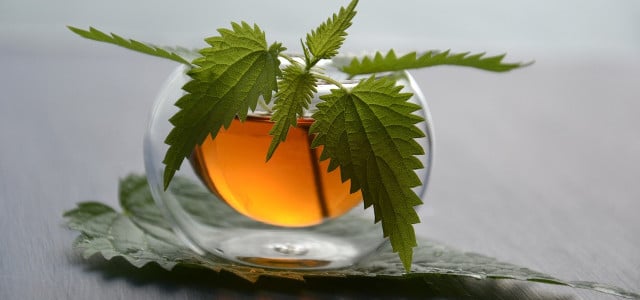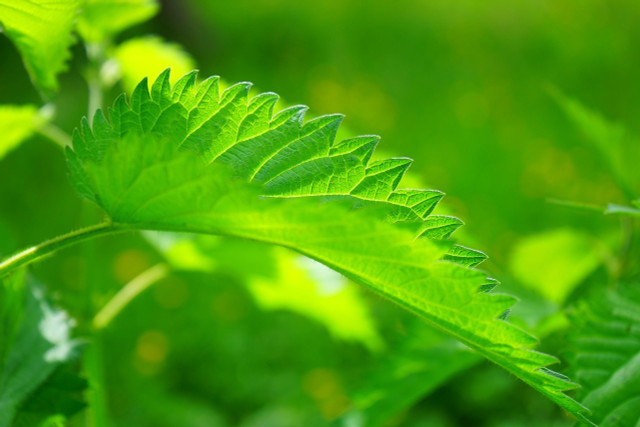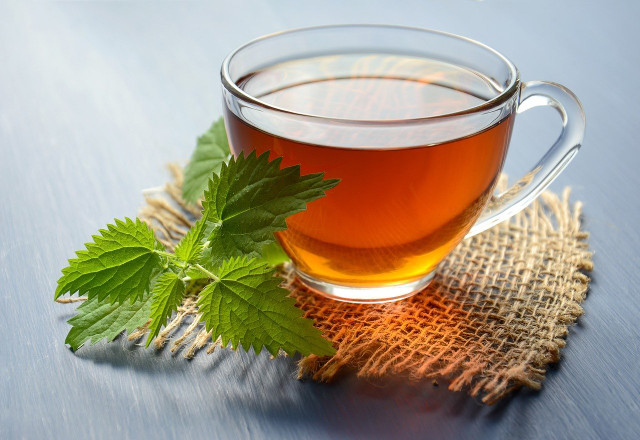
Forget about weeds! The health-promoting effects of nettle tea have been known since ancient times. You may know it as a remedy for bladder infections – but nettle tea has other positive properties as well.
Although nettles are often referred to as weeds, the wild herb has more to offer than itchy hands after touching them. It has been considered a medicinal plant for centuries. For example, you can use the leaves to make nettle tea, which has many health benefits. You can find out how to do this and how to pick nettle leaves correctly here.
Nettle tea is not only effective against cystitis
The nettle is a true miracle herb. Whether as a home remedy for cystitis or as a remedy for hair loss (nettle hair soap is available from **Waschbär, for example) – its positive effect on health has been known since ancient times. The nettle is full of vitamins and minerals, including iron, calcium, vitamin A, vitamin C, B vitamins, potassium, magnesium and sodium.
Nettle tea is said to have these effects:
-
Detoxification: As a home remedy, nettle tea is said to have a detoxifying and stimulating effect. It is said to stimulate the metabolism and help to detoxify the gall bladder and liver. However, detoxification treatments are controversial and their effectiveness is not sufficiently scientifically proven.
-
Pain-relieving and anti-inflammatory properties: The flavonoids it contains are said to relieve pain and inhibit inflammatory processes, such as those caused by rheumatism (arthritis) or joint diseases (osteoarthritis).
-
Diuretic: Because of its diuretic effect, nettle tea is a well-known home remedy for cystitis.
-
against skin impurities: As a facial toner, nettle tea works against skin irritations.
- relieves stomach and menstrual pain
- blood pressure lowering
- strengthens the immune system
There is not scientific evidence for all of these promises. According to Stiftung Warentest, nettle tea at least has a diuretic effect and is therefore possibly a useful remedy for urinary tract infections.
How to harvest nettles for nettle tea

(Photo: CC0 / Pixabay / Hans)
Nettles grow practically everywhere. Even in the city, it shouldn’t be difficult to find this medicinal plant in parks or other green spaces. Just be careful not to harvest them on busy roads, near production facilities, or in areas frequented by dogs.
In Germany, the species large and small stinging nettle are particularly widespread.
-
Timing: The ideal time to harvest is spring, when the nettle shoots are still young, tender and full of nutrients. However, you can generally harvest them from May to September.
-
Gloves: It is best to wear gloves so that you do not get burned by the nettles.
-
Pruning: Cut young shoots off at the base. Remove the numerous tiny spines by stripping the plant from the base to the head.
-
Drying: Wash the nettle shoots thoroughly at home. Then hang them in a bundle in an airy and dry place until they are completely dry.
-
Portioning: Pluck the dry leaves and store them in a tea tin.
Preparation and dosage of nettle tea

(Photo: CC0 / Pixabay / Mareefe)
Preparation:
- Pour two heaped teaspoons of nettle tea with a quarter liter of boiling water.
- Let the tea steep for about ten minutes.
Dosage:
For a detoxification treatment: Drink a quarter liter of nettle tea every day for four to a maximum of six weeks. As already mentioned, the effect is not sufficiently scientifically proven.
In the case of inflammation, for example in the bladder or prostate: If the inflammation is just beginning, you should drink a cup of freshly brewed nettle tea several times throughout the day until the symptoms improve. In the case of a bladder infection, you should drink nettle tea at the first signs. Important: If the inflammation is acute, you must definitely seek medical advice, otherwise it could lead to pyelonephritis.
For impure skin: Cleanse your face with the (cooled) brew several times a day.
By the way: You can also make your own nettle manure as fertilizer and plant protection for the garden.
Side effects of nettle tea
Nettle tea is a medicinal product – you should therefore only take it if you have any complaints. Here too, you should not consume more than a quarter litre of tea per day for a maximum period of six to eight weeks.
According to Stiftung Warentest, you should avoid nettle tea in these cases:
- if you have heart or kidney failure
- as a diabetic (sometimes nettle tea increases blood sugar levels)
- if you have an allergic reaction, for example with skin irritation or an irritated stomach
- in children under ten years of age (there are no sufficient studies on safety in children)
- if you are pregnant (here too, safety has not been clearly proven)
If in doubt, seek medical advice before using nettle tea.
Read more on Techzle\.com:
- Nettle recipes: How the plant tastes best
- Elderberry juice – cold or warm, but definitely healthy
- Pruning, caring for, propagating and overwintering rosemary
- Sage oil: effects and uses of the essential oil
- Collecting, identifying and eating wild herbs
- Home remedies for heartburn: What really helps
- Get rid of garlic smell: the best home remedies for mouth and hands
English version available: Stinging Nettle Tea: Benefits, Dosage, and Side Effects
** marked with ** or orange underlined Links to sources are partly affiliate links: If you buy here, you are actively supporting Techzle\.com, because we then receive a small part of the sales proceeds. .